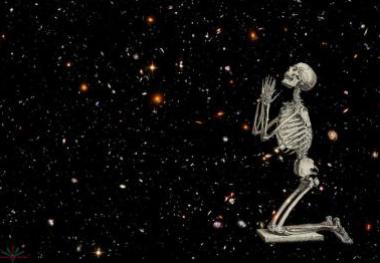“We would love to finish what we started some years ago … I think millions of people would one day love the chance to go to space.”
“Millions of people” … “the chance to go to space…” – whatever they would or would not love, millions of people will never be able to access this chance, to borrow the language of infinite opportunity. Millions of people will never have £150,000 in disposable income.
The existence of a few hundred people who can set fire to this kind of money relies on millions of people not having it.
In an unintentionally hilarious justification of the 150 grand price tag, CNN wrote: “For decades, none but a few privileged – and highly trained – individuals could dare dream of travelling beyond Earth’s orbit. All that’s set to change as Richard Branson brings space exploration to the (mega-rich) masses.”
In this version, the real elitism that divides the privileged and the rest happens when states fund space exploration to extend the reaches of human understanding. Only the free market, in the shape of Branson, can bust the battlements of elitism and let the (mega-rich) masses come rushing in.
Sub-orbital tourism holds a special place in the unlovely pantheon of “experience” consumption. The waste of fossil-fuel energy could only be considered by someone who either didn’t believe in anthropogenic climate change or didn’t care. The need to see Earth from a distance with your own eyes, whatever the cost, hints at an interior life as arid as the surface of the moon.
Why do you need to witness your planet as a dot – for perspective? Why can’t you quarry these insights from your own imagination? They would be seriously better off, all 700 of these mega-rich masses (and just incidentally, I have never been more disappointed in Angelina Jolie), buying the collected poems of John Donne for £4.99.
If Branson’s project tells us very little about the human condition except for its frivolity and emptiness, this consumer switch – from stuff to experiences – has more general implications. Neoclassical economics and, lately, politics have us all characterised as consumers. We realise our identities with the stuff we buy, having arrived at an advantageous price through the rigorous pursuit of our own consumer interests.
We interact with institutions as customers. And the people in those institutions are vendors. While this language of the self-interested consumer penetrates the social landscape ever more deeply, there is a simultaneously growing certainty that we will never be happy through the purchase of stuff – that even if resources were infinite, the act of consumption is self-defeating. All it does is stimulate the desire for more things. It’s really no more than a fetish. No material item in the history of mankind has ever brought anyone the fulfilment of a smile from the right person.
Steadily, it has become accepted wisdom that a life well lived accrues memories, not things.
Then, as soon as that realisation became mainstream, Branson steps in to monetise it: anybody who thinks you can’t put a price on a happy memory just hasn’t given enough thought to how expensive an experience can be, if you throw enough fuel and tech and lives at it.
No idea is too big or too small to be co-opted by the market, even the idea that “the market doesn’t have what you need and will do nothing to meet your elemental human yearning” will find its way into someone’s marketing strategy.
However, the marketing team may have won the battle but lost the war. When huge sums are spent on experiences, this embodies wealth in a new and useful way. Political discourse has great difficulty expressing what’s wrong, exactly, with inequality. Who cares if there are more billionaires than ever? Who cares how much of the world’s wealth is concentrated in how many hands? If it makes us all richer, does it matter how rich the richest are?
The counter argument is that, sadly, it makes us all poorer, via a number of mechanisms – my favourite memorably put by the economist Stewart Lansley: “A tsunami of hot money raced around the world at speed, in search of faster and faster returns, creating bubbles – in property, commodities and business – that eventually brought the British and global economies to their knees.” These arguments don’t stick; the causality is endlessly debated, as the culprit slips away.
However, when rich people start dropping sums that could rid whole villages of cholera – on a trip that extends humanity in no direction, that is probably pretty boring for a lot of the time and not dissimilar to flying overnight – the picture changes.
This is what inequality actually looks like: rich people burning money on fun.
That’s what the world works to service. That’s why things have to be the way they are.
The high-net-worth spacemen may discover what gangsters have known since The Lavender Hill Mob: getting the money is the easy bit, it’s when you try to spend it that the world wakes up.
A version of this article was originally published by The Guardian.


